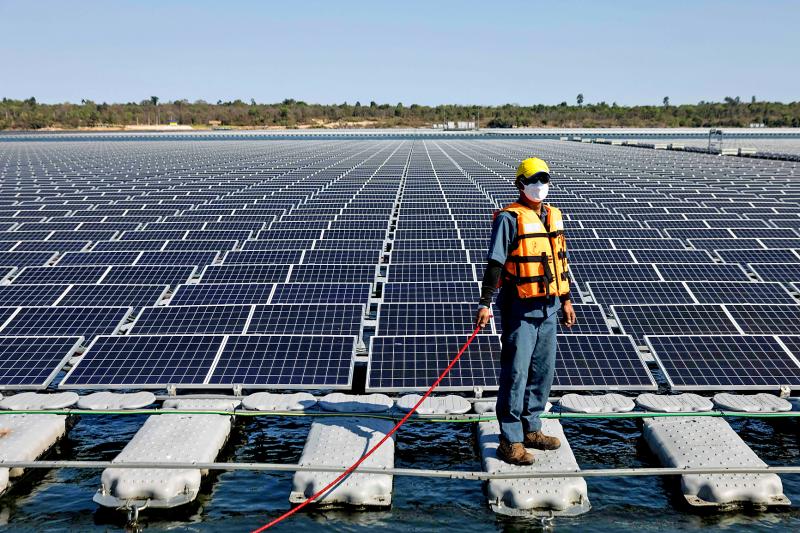A vast array of solar panels floats on the shimmering waters of a reservoir in northeast Thailand, symbolizing the kingdom’s drive toward clean energy as it seeks to achieve carbon neutrality by 2050.
The immense installation, covering 720,000m2 of water surface, is a hybrid system that converts sunlight to electricity by day and generates hydropower by night.
Touted by the authorities as the “world’s largest floating hydro-solar farm,” the project at the Sirindhorn Dam in the northeastern province of Ubon Ratchathani is the first of 15 such farms that Thailand plans to build by 2037.

Photo: AFP
The kingdom is stepping up efforts to wean itself off fossil fuels, and at the COP26 climate conference in Glasgow last year, Thai Prime Minister Prayuth Chan-ocha set the target of carbon neutrality by 2050, followed by net-zero greenhouse emissions by 2065.
The farm on the Sirindhorn Dam — which began operations last October — has more than 144,000 solar cells, covering the same area as 70 soccer fields, and can generate 45 megawatts (MW) of electricity.
“We can claim that through 45MW combined with a hydropower and energy management system for solar and hydro powers, this is the first and biggest project in the world,” Electricity Generating Authority of Thailand deputy governor Prasertsak Cherngchawano said.
The hybrid energy project aims to reduce carbon dioxide emissions by 47,000 tonnes per year and to support Thailand’s push toward generating 30 percent of its energy from renewables by 2037, the public utility said.
However, hitting these targets requires a major revamp of the kingdom’s power generation.
Thailand relies heavily on fossil fuel, with 55 percent of power derived from natural gas as of October last year, compared with 11 percent from renewables and hydropower, the Thai Energy Policy and Planning Office said.
The public utility plans to gradually install floating hydro-solar farms in 15 more dams across Thailand by 2037, with a total power generation capacity of 2,725MW.
The US$35 million Sirindhorn project took nearly two years to build — including COVID-19 holdups caused by delays to solar panel deliveries and technicians falling sick.
Most of the electricity generated by the floating hydro-solar farm goes to the provincial electricity authority, which distributes power to homes and businesses in provinces in the lower northeastern region of Thailand.
As well as generating power, officials hope that the giant solar farm will also prove a draw for tourists.
A 415m-long “Nature Walkway” shaped like a sunray has been installed to give panoramic views of the reservoir and floating solar cells.
“When I learned that this dam had the world’s biggest hydro-solar farm, I knew it was worth seeing with my own eyes,” tourist Duangrat Meesit, 46, said.
Some locals have reservations about the floating hydro-solar farm, with fishers complaining that they have been forced to change where they cast their nets.
“The number of fish caught has dropped, so we have less income,” village headman Thongphon Mobmai, 64, said. “But locals have to accept this mandate for community development envisioned by the state.”
However, the public utility insists that the project will not affect agriculture, fishing or other community activities.
“We’ve only used 0.2 to 0.3 percent of the dam’s surface area. People can make use of the land for agriculture, residences and other purposes,” Prasertsak said.

A Chinese scientist was arrested while arriving in the US at Detroit airport, the second case in days involving the alleged smuggling of biological material, authorities said on Monday. The scientist is accused of shipping biological material months ago to staff at a laboratory at the University of Michigan. The FBI, in a court filing, described it as material related to certain worms and requires a government permit. “The guidelines for importing biological materials into the US for research purposes are stringent, but clear, and actions like this undermine the legitimate work of other visiting scholars,” said John Nowak, who leads field

Brazil, the world’s largest Roman Catholic country, saw its Catholic population decline further in 2022, while evangelical Christians and those with no religion continued to rise, census data released on Friday by the Brazilian Institute of Geography and Statistics (IBGE) showed. The census indicated that Brazil had 100.2 million Roman Catholics in 2022, accounting for 56.7 percent of the population, down from 65.1 percent or 105.4 million recorded in the 2010 census. Meanwhile, the share of evangelical Christians rose to 26.9 percent last year, up from 21.6 percent in 2010, adding 12 million followers to reach 47.4 million — the highest figure

Swedish campaigner Greta Thunberg was deported from Israel yesterday, the Israeli Ministry of Foreign Affairs said, the day after the Israeli navy prevented her and a group of fellow pro-Palestinian activists from sailing to Gaza. Thunberg, 22, was put on a flight to France, the ministry said, adding that she would travel on to Sweden from there. Three other people who had been aboard the charity vessel also agreed to immediate repatriation. Eight other crew members are contesting their deportation order, Israeli rights group Adalah, which advised them, said in a statement. They are being held at a detention center ahead of a

‘THE RED LINE’: Colombian President Gustavo Petro promised a thorough probe into the attack on the senator, who had announced his presidential bid in March Colombian Senator Miguel Uribe Turbay, a possible candidate in the country’s presidential election next year, was shot and wounded at a campaign rally in Bogota on Saturday, authorities said. His conservative Democratic Center party released a statement calling it “an unacceptable act of violence.” The attack took place in a park in the Fontibon neighborhood when armed assailants shot him from behind, said the right-wing Democratic Center, which was the party of former Colombian president Alvaro Uribe. The men are not related. Images circulating on social media showed Uribe Turbay, 39, covered in blood being held by several people. The Santa Fe Foundation